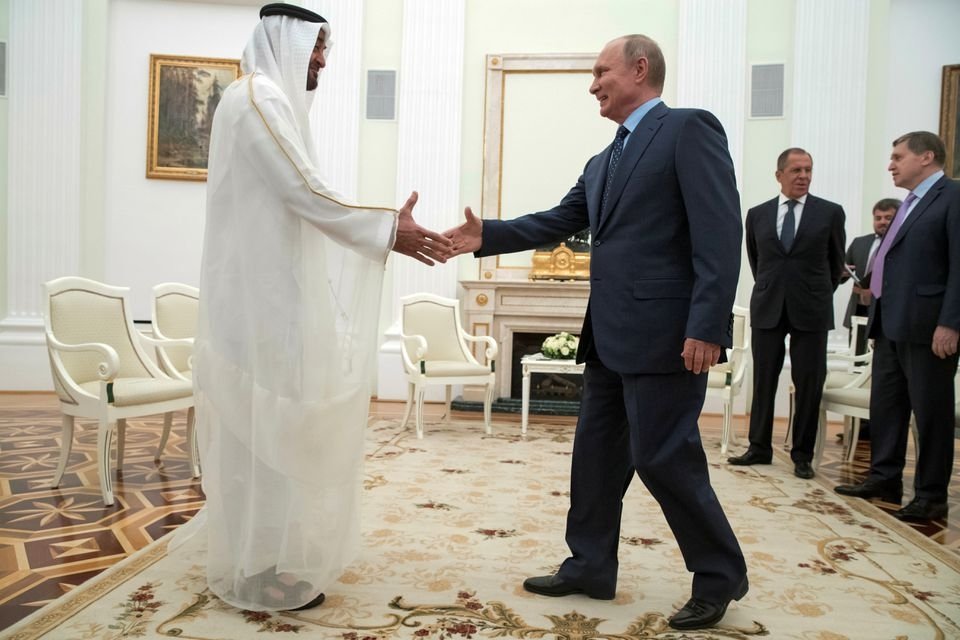© Turkuvaz Haberleşme ve Yayıncılık 2024
Hours after reports confirmed American basketball star Brittney Griner’s release from a penal colony in Russia in exchange for the Russian arms dealer Viktor Bout, the public learned that the United Arab Emirates (UAE) mediated the deal and Saudi Arabia, at least according to the Emirates, assisted.
The realization that Abu Dhabi-led mediation efforts possibly surprised those working under the false presumption that the Gulf states and wider Middle East are simply spectators in the ongoing great powers conflict. These countries have little impact or interest, and their leaders are not doing anything personally – at least that's what many assume.
In a world where the West sees the Gulf, at best, as a bystander and, at worst, a pawn in ongoing great power competitions, there is no shortage of commentary on how the war will impact the Middle East, whether through rearranging oil production and pricing, the impact of grain and other shortages, and the refocusing of foreign policies. But there is little appreciation for how Middle Eastern heavyweights are impacting key conflicts and leveraging the war for their own national gains.
In fact, this is not the first time a Gulf state has played a pivotal role in the current conflict. Few appear to recall that in September, Saudi Crown Prince Mohammad bin Salman (MBS) negotiated a desperately needed prisoner swap between Russia and Ukraine that led to the release of 10 foreign fighters captured by Russian forces, including some United States and United Kingdom citizens who had been fighting on the Ukrainian side. Nor do they recall the key role played by President Recep Tayyip Erdoğan in that negotiation and the release of desperately needed grain from Ukrainian ports.
That these efforts have gained little attention or appreciation on the world stage is a reflection of our lack of understanding of both the region and its leadership. Making matters worse, Western governments have criticized Gulf countries, in particular, for their perceived lack of support for Ukraine, falling back on Abu Dhabi and Riyadh’s early refusals to cut ties with Moscow as well as the United Arab Emirates (UAE) abstaining in early March 2022 from the first United Nations Security Council resolution on the Ukraine war – a move meant to secure Russian support for a later U.N. resolution condemning the Houthi rebels in Yemen.
Gulf Cooperation Council (GCC) states’ early diplomatic maneuvering occurred in the broader context of the nations’ strategic interests and should not be confused with unequivocal support for Russia. The Gulf states’ diplomatic choreography reflects a conscious choice to promote their long-term economic and other interests in maintaining ties with Moscow, as well as with the West – a decision not unlike those made by some of the U.S.' NATO allies such as Hungary and Türkiye. Even the U.S. treads lightly with Russia on oil and the sanctioning of some oligarchs most supportive of Putin, and Middle Eastern countries are making the same decision to sustain productive relations with China to achieve their national goals. At a minimum, their objectives also position themselves as potential helpful intermediaries among the powers in conflict.
Other factors push Gulf states to maintain relations with Russian President Vladimir Putin’s government. Most importantly, the GCC members see their relations with Moscow as necessary to combat the rapidly deepening Russian-Iranian partnership. As cooperation continues to expand through the transfer of Iranian drones – and possibly other weaponry like missiles – to Russian forces, Gulf states are hesitant to fully cut ties with Putin out of fear that it could remove yet another roadblock to this troubling cooperation. This is especially true amid reports that Moscow may be planning to send Tehran Su-35 fighter jets.

In addition, Saudi Arabia and the UAE carefully monitor positions with Russia for fear of reverberating effects on the oil market. Both Saudi Arabia and the UAE see sustaining relations with Moscow as necessary to coordinate oil production as well as to preserve unity within OPEC+. Russian support is integral to maintaining their desired level of oil production and price per barrel, which is critical to their financial and commercial interests. For many years, the Saudis sought energy cooperation with Russia, and Riyadh has no intention of abandoning its partnership with Moscow via OPEC+ given how important oil remains to the kingdom’s economy.
Positioning themselves as mediators in Ukraine also allows Gulf states to work toward another national priority – challenging Erdoğan from his position as the perceived critical negotiator in the conflict. Since the Russian invasion in February, Türkiye has worked hard to make itself indispensable in the Ukraine war, helping save a grain export deal after Russia suddenly withdrew from the agreement and repeatedly hosting negotiations between Moscow and Kyiv in Istanbul and Antalya. Outside the diplomatic sphere, Erdoğan engaged in extraordinary diplomatic jiujitsu by continuing to engage Putin substantively while supplying Ukraine with weaponry like its popular Bayraktar TB2 drones, Kirpi armored troop carriers and body armor.
Despite Riyadh and Abu Dhabi’s rapprochements with Türkiye, Ankara’s expansionist foreign policy agenda remains a concern in these Gulf capitals. Yet, a challenge for Saudi Arabia and the UAE when it comes to efforts to counter Türkiye’s diplomatic clout vis-à-vis the Russians and Ukrainians is that Riyadh and Abu Dhabi lack much of the leverage over Moscow that Ankara possesses in relation to the Black Sea as well as Turkish-Ukrainian military cooperation.
